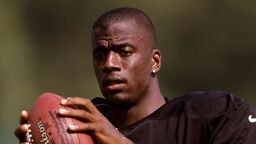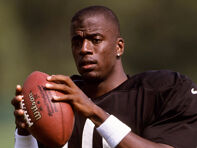There is surely no sports league on earth that embraces the LGBTQ community as warmly and comprehensively as the AFLW.
The competition has been going for nine seasons, and this is the fifth consecutive year that an official Pride Round has been held — and it’s bigger and bolder than ever before.
All 18 teams are wearing special-edition guernseys, the yellow Sherrin matchballs have rainbow stripes, umpires are waving Pride flags and even the boundary arcs are multicolored.
Get off the sidelines and into the game
Our weekly newsletter is packed with everything from locker room chatter to pressing LGBTQ sports issues.
AFLW Pride Round is here 🌈#AFLWSaintsGiants pic.twitter.com/yblSZYh2u7
— AFL Women's (@aflwomens) October 8, 2024
Backing up this riot of rainbows is substantial representation by out athletes. Back in 2020, the women’s sport website Siren reported on the Pride Games being held at the time in the league, saying: “It’s estimated that 70-80% of the AFLW is made up of same-sex attracted players.”
There were 10 players from clubs across the country in attendance at the official Pride Round launch event held at Melbourne’s Whitten Oval on Monday.
It’s at the 10,000-capacity stadium that the marquee match of Week 7 will take place, when the Western Bulldogs host Essendon on Friday, with promised entertainments including the “Poof Doof Pride Patrol” queer disco truck, and performances from drag queens including Bettie Rose, who was also at the launch.
So was Issy Grant, a defender for the Bulldogs who were one of the first women’s clubs to establish a dedicated Pride Game.
“Something that we value — not just as a club, but as a playing group too — is bravery. Being one of the first clubs to put their hand up and support something like a (Pride Game), that’s brave,” she told the Bulldogs website.
“It’s a similar link to the LGBTQIA+ community, in that being yourself and being your true identity — that’s hard, that’s brave.”
The assumption from some will be that the AFLW and perhaps even women’s sport in general is now so queer-friendly that Pride activations aren’t as necessary these days.
Tanya Hosch, the AFL’s inclusion manager, disagrees.
“Young LGBTQI+ people are half as likely to be part of a sporting club than non-LGBTQI+ youth,” she told reporters at the launch.
It’s no surprise that the vast majority of that discrimination comes on the men’s side of the sport, which has been hit this season by a series of incidents involving anti-gay language.
Related


Teenage footballer gets SIX-game ban for ‘multiple’ anti-gay slurs — but AFL chief denies homophobia problem
St Kilda forward Lance Collard is the fourth AFL player or coach to be punished for use of anti-LGBTQ language this season.
By Jon Holmes | July 17, 2024
While the perpetrators have been hit with bans and fines, escalating in severity, the AFL continues to hold off from staging a league-wide Pride Round (although the Sydney Swans have been involved in individual Pride Games since 2015).
However when asked by the media if a men’s version might be brought in any time soon, Hosch replied: “We’re often criticised for having too many rounds… it can feel quite crowded.
“But I definitely wouldn’t rule it out and I wouldn’t be surprised if one day we do have a round.”
A glance at the comments on an AFL Facebook page post about the AFLW Pride Round would quickly lead you to believe that the men’s fanbase is vehemently opposed to the displaying of rainbows.
That’s far from the most accurate gauge of supporters’ attitudes (the AFL page’s follower count is seven times greater than that of its sister league) but the extent of negativity and whataboutery on the page is depressing nevertheless.
Not that the AFLW players themselves seem to care, and why should they? The community spirit in their league is so strong, with enormous unity between the stars and the fans coming together to build fearlessness.
@aflwomens What Pride Round means to our players ❤️🏳️🌈 #aflw #pride #footy #aflwpride ♬ Circles – Instrumental – Post Malone
That fearlessness was exemplified by a comment from Adelaide’s Anne Hatchard.
“I hid it because I wasn’t sure how people were going to react and I cared so much about what others thought of me that I was pretending to be someone I wasn’t for such a long time,” Hatchard said in an interview on the Crows website. “It was such a scary feeling.”
Now she’s a three-time title winner with Adelaide, married to her wife Georgie.
For now, the men’s league remains a mere shadow of its women’s counterpart when it comes to this part of inclusion, despite a 2023 survey suggesting that Australia’s LGBTQ population could be as high as 10%.
Subscribe to the Outsports newsletter to keep up with your favorite out athletes, inspiring LGBTQ sports stories, and more.










































